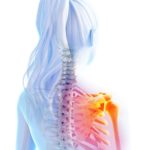 The human arm is able to move in many directions because the shoulder joint has the widest range of motion compared to any other joint in the body. Unfortunately, the versatile movement of the shoulder joint subjects it to less stability than other joints in the body. A common injury among athletes is a torn rotator cuff. The rotator cuff is comprised of the tendon and muscle mass forming the link between the shoulder and the arm.
The human arm is able to move in many directions because the shoulder joint has the widest range of motion compared to any other joint in the body. Unfortunately, the versatile movement of the shoulder joint subjects it to less stability than other joints in the body. A common injury among athletes is a torn rotator cuff. The rotator cuff is comprised of the tendon and muscle mass forming the link between the shoulder and the arm.
Torn Rotator Cuff Treatment
The rotator cuff consists of four tendons and muscles forming a cuff around the top of the humerus keeping your arm in your shoulder socket. The cuff allows you to lift your arm and rotate it in many different directions. Too much stress on the shoulder, including repetitive motions or sudden trauma, can cause an injury to the rotator cuff. Partial or full-thickness tearing of tendons may occur within the rotator cuff.
- A rotator cuff tear causes pain keeping you from participating in your athletic activities
- A torn rotator cuff also makes simple daily tasks difficult to perform without pain
A torn rotator cuff can inhibit tasks such as getting dressed. The pain can make changing a light bulb in a ceiling light impossible to perform.
Diagnosing a Torn Rotator Cuff
When diagnosing a torn rotator cuff, OCOrthopedic+ founder and medical director – Dr. Howard Marans – will ask you to move your arm in various directions. The Doctor observes your arm movements and determines which ones are causing your pain.
Depending upon your symptoms, the Doctor may order one or more tests, including:
- Shoulder X-rays with special views
- MRI
- Arthrogram – An X-ray or MRI of the shoulder after dye has been injected into the joint allowing for greater viewing detail
- Arthroscopy – A tiny camera is inserted through a small incision in your shoulder to view the rotator cuff
The tests will help your doctor rule out other possible shoulder conditions and confirm that your rotator cuff is torn.
Options for Torn Rotator Cuff Treatment
Often, all that is needed to recover from a torn rotator cuff is conservative treatment, including:
- Resting the shoulder and avoiding movements that cause pain
- Your arm and should may be immobilized with a sling
- Icing your shoulder several times a day to reduce swelling and pain
- Performing exercises to maintain your range-of-motion
- Physical therapy to make your shoulder stronger
- Taking anti-inflammatory painkillers, including NSAIDs to reduce inflammation and provide pain relief
When conservative treatment options have not worked, or if you have a full thickness tear, arthroscopic surgery may be your only option to treat your torn rotator cuff. The best surgical option for torn rotator cuff treatment when possible is arthroscopic surgery. Its recovery time is usually shorter and requires less physical therapy than other types of surgery.
Renowned Doctor Providing Torn Rotator Cuff Treatment
Nationally renowned Dr. Howard Marans will discuss the best options to treat your torn rotator cuff after thoroughly performing diagnostic testing. The Doctor will explain the pros and cons of each procedure and the expected outcome for you to return to full activity.
To schedule a consultation with Dr. Marans, please click the icon below and enter your information online – or – call 714.979.8981.


